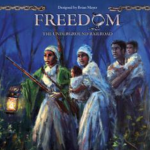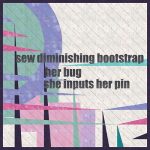writing (post)feminism
In Conversation with the Decameron 2.0

Jin Sol Kim and Lulu Liu interview the Decameron 2.0, a Canadian collaborative made up of professors and artists who are inspired by Giovanni Boccaccio’s plague narrative The Decameron (1348-1353) to develop creative works during and in response to the COVID-19 pandemic.
How to Design Games that Promote Racial Equity

In this conversation and accompanying "How to Not" guide, Drs. Lai-Tze Fan, Kishonna Gray, and Aynur Kadir consider responsible theories and methods towards racial equity, racial justice, and anti-racism in game design. Their main focus is on how games can provide a platform for helping people understand and learn about these issues.
Re:traced Threads: Generating Feminist Textile Art with Tracery

On feminist futures of electronic literature (and interactive narrative, more broadly construed).
Meaning, Feeling, Doing: Affective Image Operations and Feminist Literatures of Care on Instagram

Gathering screen images and texts shared by artist Les folies passagères on Instagram, Gravel-Patry addresses issues of care that affect women on a daily basis, from mental health to body dysmorphia - but also creating expansive life worlds through our relationality with the digital image, how we operationalize it so that we might think and feel our lives differently.
"These Waves …:" Writing New Bodies for Applied E-literature Studies

Against the backdrop of écriture feminine and e-lit texts, Ensslin et. al advance methods and findings of the "Writing New Bodies" project (“WNB”; SSHRC IG 435-2018-1036; Ensslin, Rice, Riley, Bailey, Fowlie, Munro, Perram, and Wilks) to lay the foundations of Applied E-literature Research. Their aim is to develop a digital fiction for a new form of contemporary, digital-born bibliotherapy. In following the principles of critical community co-design and feminist participatory action research, WNB engages young woman-identified and gender nonconforming individuals ages eighteen to twenty-five in envisioning worlds where they feel at home in their bodies. The workshops encourage them to engage, conversationally and through reading, co-designing and writing digital fiction, with key challenges facing young women today, including cis- and heteronormative gender relations, racism, anti-fat attitudes, ableism, and familial influences on the ways young women “ought to look” (Rice). This essay originally appeared as a keynote at the 2019 ELO conference in Cork, delivered by Ensslin.